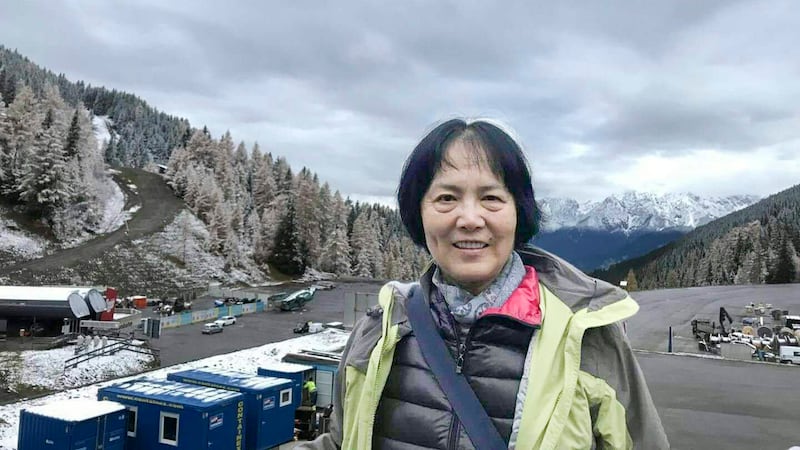Chinese authorities have ordered relatives of those who died in the 1989 Tiananmen massacre not to give media interviews, while veteran activists who took part in the pro-democracy movement that year are slapped with restrictions as part of a nationwide "stability maintenance" operation ahead of the 35th anniversary of the bloodshed, Radio Free Asia has learned.
A security guard has been posted outside the home of Zhang Xianling, a founding member of the Tiananmen Mothers victims group whose 19-year-old son died in the military assault on Beijing, group spokesperson You Weijie told RFA Mandarin.
"Most of the victims' families haven't been placed under guard for the 35th anniversary this year," You said. "Only Zhang [Xianling] has -- there are guards outside her door."
"We have all been told not to give interviews to journalists in our homes because the anniversary of June 4 is nearly here," she said.
The move is part of the ruling Chinese Communist Party's " stability maintenance" system that aims to control the words and movements of anyone they think might cause some kind of trouble for the authorities on politically sensitive dates.
Public mourning for victims or discussion of the events of spring and summer 1989 are banned in China, and references to June 4, 1989, are blocked, filtered or deleted by the Great Firewall of government internet censorship.
Hunger strike
Xu Guang, a former student leader of the 1989 protest movement at Hangzhou University stood trial in the eastern province of Zhejiang in April 2023 for "picking quarrels and stirring up trouble," a charge frequently used to target peaceful critics of the Communist Party, after he refused food and drink in detention to commemorate the Tiananmen massacre.
You said the group plans to lay offerings to their lost loved ones at the cemetery privately, as they have on past anniversaries, under the watchful eye of state security police.
She said Zhang and group founder Ding Zilin are elderly, with age-related health issues, but "aren't doing too badly."

Meanwhile, former 1989 student hunger-striker and rights lawyer Pu Zhiqiang has been taken out of Beijing on an enforced "vacation" by state security police ahead of the anniversary, a person familiar with the situation told RFA.
Dissident journalist Gao Yu could soon follow suit, the person said.
A Beijing-based rights activist who gave the pseudonym Mr. Qin for fear of reprisals said it's hard for anyone with ties to human rights activism or the pro-democracy movement to go anywhere at this time of year.
"The atmosphere in Beijing is very tense right now," he said. "It's hard to get together for a meal with friends if you're on the list of so-called sensitive figures."
"They will stop people from getting together to cook and eat together in their homes, even if they're not on the list," Qin said. "Naturally, it's more sensitive here in Beijing, because that's where [the massacre] happened."
"I think a lot of people in Beijing will be taken on 'vacations' this year," he said.
Taken out of town
Ji Feng, an independent commentator who led student protests in the southwestern province of Guizhou in 1989, said he is also being taken out of town ahead of the anniversary, despite no longer living in Beijing.
"Every anniversary ending in 5 or 0 is a bigger one, and there will be quite an uproar overseas this year, for the 35th anniversary," Ji told RFA Mandarin in a recent interview.
"This year, we're not allowed to mention the anniversary or June 4, and we're not allowed to go far," Ji said. "In the past, they would take me anywhere, even around Beijing."
"Now, we have to stay in the vicinity of Zunyi city," he said, adding that the local authorities seem less willing to spend money on "stability maintenance" measures this year.
"Maybe finances are tight, and they have no money," Ji speculated, in a reference to recent reports of cash-strapped local governments.
In Shanghai, rights activist Shen Yanqiu said she has been called in to " drink tea" with state security police almost daily in the run-up to the anniversary, and warned off going anywhere or meeting anyone.
"Rights defenders and dissidents alike are under tight surveillance around June 4," Shen said. "We can't arrange anything because they're afraid we'll contact foreign media organizations or hold citizen gatherings."
"It's basically because the authorities are afraid," she said.
Shen said she had postponed plans to try to visit pandemic citizen journalist Zhang Zhan following her May 13 release from Shanghai Women's Prison, because she expects Zhang to be under particularly tight surveillance.
Translated by Luisetta Mudie. Edited by Malcolm Foster.
